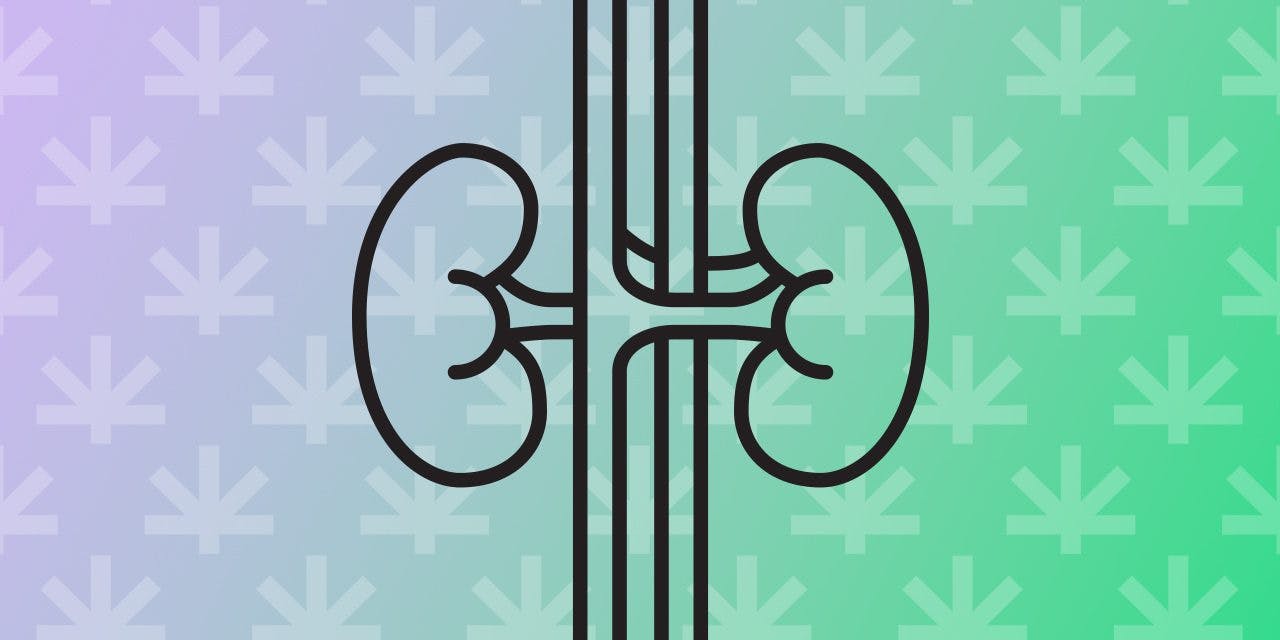Can Weed Cause Kidney Stones?

Article written by

Dipak HemrajHead of Research and Education
Content reviewed by

Dr. Lewis JasseyMedical Director - Pediatric Medicine
There is currently little evidence to suggest that weed can cause kidney stones, or negatively affect kidney health in general, in healthy people. Cannabis could actually relieve the pain and nausea often experienced with kidney stones and assist with facilitating the exertion of the kidney stones through the urine. Medical cannabis could also help treat inflammation associated with chronic kidney disease (CKD).
Get Your Medical Card
Connect with a licensed physician online in minutes.
How Kidney Stones Form
Kidney stones are hard, pebble-like deposits made of various minerals and salts. They form in the kidneys when you have high levels of certain materials in your urine. Kidney stones often bring severe pain, nausea and vomiting.
Anybody can develop kidney stones. However, some factors increase the risk. Some underlying conditions associated with kidney stones include having a blocked urinary tract, chronic bowel inflammation, cystic kidney diseases, gout and obesity (due to diet). Certain medications like diuretics and calcium antacids also increase the risk. Lastly, genetics can also play a role.
There are four main types of kidney stones:
- Calcium stones are the most common type, developing when calcium becomes trapped in the kidneys instead of being excreted through the urine.
- Uric acid stones typically occur after long-term consumption of food containing too much uric acid.
- Struvite stones usually occur after a urinary tract infection.
- Cystine stones develop when an amino acid called cysteine enters the urine, which often occurs due to a genetic disorder called cystinuria.
Traditional Treatments for Kidney Stones
Very small kidney stones may pass through the urinary tract without any treatment painlessly. But this is not the case for many kidney stones.
Most traditional treatments for kidney stones rely on some form of surgery. Shock wave lithotripsy breaks kidney stones into tiny pieces to pass through the urinary tract. A cystoscopy involves an examination of the stone through the urethra or bladder before surgical removal. Similarly, a ureteroscopy involves an examination through the uterus and kidneys before the kidney stone is removed surgically. Finally, percutaneous nephrolithotomy removes large kidney stones by inserting a tube in your back.
How Marijuana Interacts with the Kidneys
Like many organs in the body, cannabinoid receptors are present in the kidneys. Therefore, cannabis can impact kidney health and influence several kidney functional processes, such as renal blood flow, the rate of blood flow in the kidney (glomerular filtration rate), thickening of the tissue (fibrosis), the presence of protein in the urine, and functioning of the renal tubules.
Stimulation of the endocannabinoid receptors can have a negative or positive effect on the kidneys.
It is thought that cannabis has medicinal benefits for treating the symptoms of chronic kidney disease and end-stage renal disease by manipulating the endocannabinoid system.
It is promising that the activation of one of the endocannabinoid receptor types leads to anti-inflammatory effects in the kidney. A study in mice showed this as a therapeutic target for reducing renal inflammation.
On the other hand, the distribution, type and timing of activation of the receptors are essential considerations , and if those factors are dysfunctional, the endocannabinoid system is more likely to have negative effects on kidney health.
Fortunately, cannabis does not seem to affect the functioning of the kidneys in healthy people. In particular, there has been no evidence of CBD having adverse effects on the kidneys. Despite this, it is recommended that people with chronic kidney disease should still be monitored if using it, and the cannabis should not be smoked. CBD also has immunosuppressive properties, meaning that it can interact with medications given to kidney transplant patients.
Some studies in young adults have found an association between greater marijuana exposure and worse glomerular filtration rate after 10 years. This association may be stronger amongst those who already have kidney disease. Some researchers believe that this could lower kidney function or result in toxicity over time. However, the research in this area remains limited.
Download Free Guide to the ECS
The Connection Between Cannabis and Kidney Stones
There are limited human-based studies that directly connect cannabis to causing and/or treating kidney stones. Currently, no studies or research suggest that cannabis can cause kidney stones.
Historically, cannabis has been used to facilitate the excretion of small kidney stones. Additionally, even if cannabis doesn’t directly help treat kidney stones, it will likely provide indirect benefits. This is owing to the well-known analgesic (painkilling) and muscle relaxant properties of cannabis, which exert their action through the endocannabinoid system.
Since people with kidney stones experience pain, muscle spasms, and nausea, cannabis could help manage these effects. Additionally, renal colic (a type of pain that occurs if the kidney stones block the urinary tract) can also be alleviated with painkillers and anti-inflammatories, again suggesting the potential of medical cannabis to treat these symptoms.
The Bottom Line
For most healthy young people, weed has not been shown to cause kidney stones. However, further research and human-based clinical trials need to be conducted before coming to a conclusion.
Rather than causing kidney stones, some research has shown that weed may help treat them. This is due to cannabis’s well-known effects of painkilling, anti-inflammatory, and muscle relaxant.
Get Your Medical Card
Connect with a licensed physician online in minutes.
Frequently Asked Questions
Is weed good for kidney stones?
There has not been much research conducted to discover whether weed can be used to treat kidney stones directly. However, there is robust evidence that weed can be used to manage pain for various reasons and conditions and that weed has the potential to support the healthy functioning of the kidneys.
It’s believed that weed helps manage the pain of having a kidney stone, which could help manage the pain usually experienced with kidney stones. In particular, weed could help manage or reduce the extreme pain felt when a kidney stone passes through the urinary tract.
What is the effect of marijuana on the kidneys?
Marijuana affects the kidneys because the cannabinoid receptors that partly make up the endocannabinoid system exist throughout the kidneys.
For most healthy individuals, marijuana use does not harm the kidneys. In fact, the stimulation of the receptors by cannabinoids in cannabis could have several medicinal benefits. This includes, but is not limited to, reducing pain and muscle spasms, renal colic, and inflammation.



